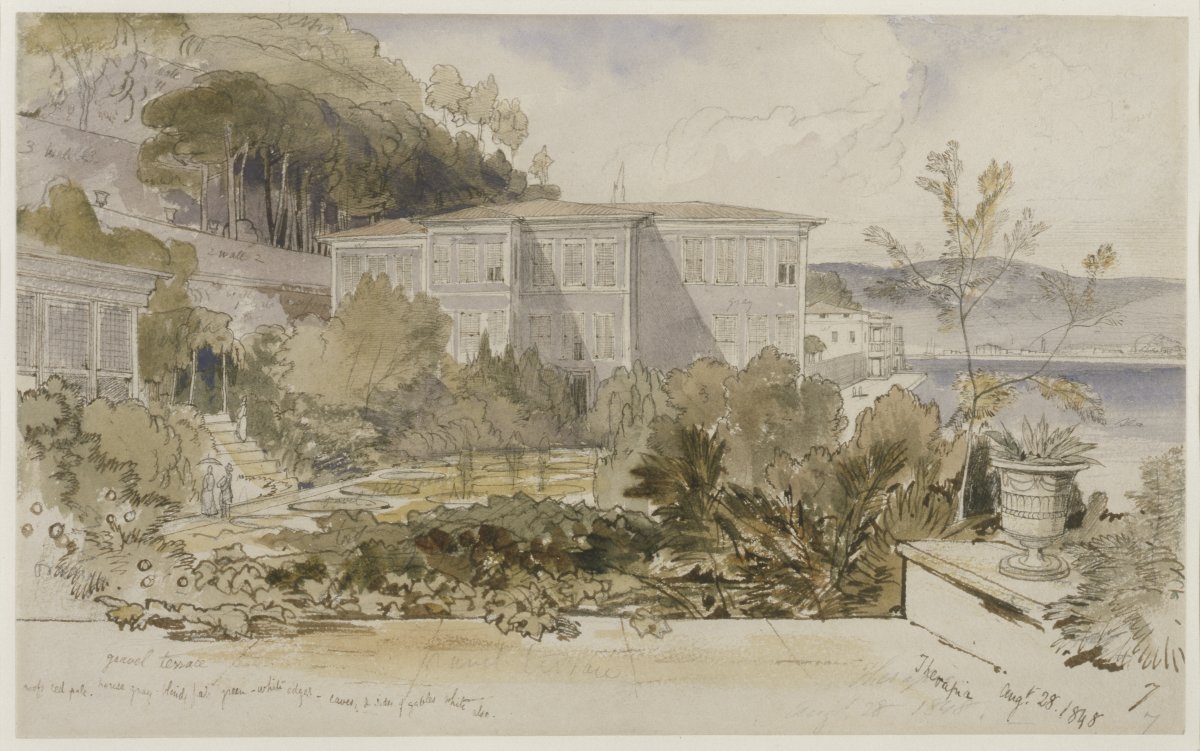Therapia
Pencil, pen and brown ink and watercolour on paper
28 August 1848
-
About the work
- Location
-
Country: Turkey
City: Istanbul
Place: British Consulate-General
The house at Therapia on the banks of the Bosphorus was the summer residence of the British Ambassador at Constantinople. At the time Edward Lear painted this view in August 1848, the Ambassador was Stratford Canning (1786-1880), later Viscount Stratford de Redcliffe. Edward Lear is now known primarily for his nonsense poetry, but he was also an accomplished artist and an enthusiastic traveller. Following a chance encounter with Lear in Corfu in 1848, Stratford Canning invited the artist to join his party travelling to Constantinople. Lear fell ill in Athens and was nursed back to health at Therapia, where he spent three months convalescing and giving drawing lessons to the Ambassador's daughters.
-
About the artist
Edward Lear, best known for nonsense verse and limericks, was also a topographical landscape painter, musician, travel writer, ornithological and natural history draughtsman and an illustrator. Largely self-taught as a painter, he began by drawing animals at Knowsley Hall menagerie; later moving to landscape painting. He lived in Italy from 1837 to 1848, returning briefly when Queen Victoria requested twelve drawing lessons. He later studied at the Royal Academy Schools (1850-51). In 1852 he was introduced to William Holman Hunt, whose paintings became a great influence. From the early 1860s, Lear’s reputation as a landscape painter declined, perhaps partly a result of the mass-produced watercolours he made, which he called ‘Tyrants’.
-
Explore
- Places
- Subjects
- Materials & Techniques
-
Details
- Artist
-
Edward Lear (1812 - 1888)
- Title
- Therapia
- Date
- 28 August 1848
- Medium
- Pencil, pen and brown ink and watercolour on paper
- Dimensions
- height: 20.00 cm, width: 32.00 cm
- Acquisition
- Purchased from Christie's, 28 November 2000
- Inscription
- br: Therapia Augt.28.1848 / 7 [in pencil and repeated in ink] ; various colour notes in ink and pencil
- Provenance
- Probably the estate of the artist; sold through Craddock & Barnard of Museum Street, London, or Tunbridge Wells during the 1930s; with The Fine Art Society, London, by April 1945; sold through Christie's, London, 'British Art on Paper' sale, on 28 November 2000 (Lot 179); from which sale purchased by the Government Art Collection
- GAC number
- 17517